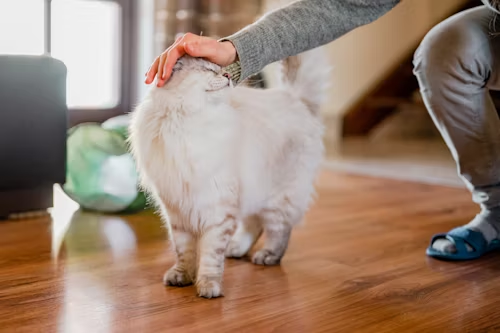Have you ever experienced this? Your cat is perfect in every way and seems to love you very much, yet it just won’t let you pick it up. You can pet it, it can rub against you, but when it comes to being held—no way. The moment you try to lift it, your cat shows clear signs of displeasure and might even try to run away. You feel confused and a bit helpless—if it loves you so much, why won’t it let you hold it?
-
Balance Disruption
Cats have an incredibly precise balance system centered around the vestibular organs in their inner ears. When you pick a cat up, its usual sense of gravity and spatial orientation is instantly disturbed. Studies show that when cats are lifted, their vestibular organs send a flood of confusing signals to the brain, like a navigation system suddenly thrown off course. In one experiment, researchers fitted 20 cats with tiny motion sensors to monitor their physiological responses when picked up. The results revealed that within 2 seconds of being lifted, the activity of hair cells in the cats’ inner ears increased by 40% compared to normal. For cats, being picked up is an overstimulating experience that causes dizziness and insecurity — one of the key reasons many cats dislike being held. -
Olfactory Overload
When you hold a cat close, your scent is right up near its sensitive nose. Cats have an extremely keen sense of smell, and any unfamiliar or unpleasant odors on you can be off-putting. For example, the scents of perfumes, lotions, or even food residues on your skin can irritate a cat’s nose. Research involving different scented hand creams showed that when the scent concentration exceeded the cat’s comfort threshold, 82% of cats fled within 3 seconds of contact. To a cat, strong and unfamiliar smells are like unidentified intruders, and the closeness of a hug leaves them nowhere to escape — making many cats averse to being hugged.

-
Opposite Temperature Sensation
A cat’s normal body temperature ranges from about 38.5°C to 39.5°C (101.3°F to 103.1°F), slightly higher than humans. Cats are also very sensitive to temperature changes. When you, at roughly 36.5°C (97.7°F), hug a cat, it can feel like being wrapped in a sudden “cold towel.” In cold weather especially, cats may actually feel chilled after being held. Studies show that within five minutes of being held, a cat’s surface body temperature drops on average by 1.2°C (2.2°F). Conversely, in summer, hugging can also be unpleasant because it restricts the cat’s movement and ability to seek cooler spots or stretch out to cool down. Additionally, close physical contact increases heat transfer. If you’re warm and sweaty, your moist heat can make the cat even more uncomfortable. -
Individual Personality Differences
Every cat has its own unique personality, just like people. When it comes to hugs, some cats accept them, while others resist. Research indicates that a cat’s temperament is influenced by genetics, early life experiences, and socialization. Cats raised in loving, secure environments with frequent human interaction tend to be more accepting of hugs. On the other hand, cats who’ve had negative experiences with being held or naturally timid personalities are more likely to dislike hugs.
Now you know, when a cat resists being held, it’s not because it doesn’t love you, but because of other reasons. So, does your kitty let you pick it up?

